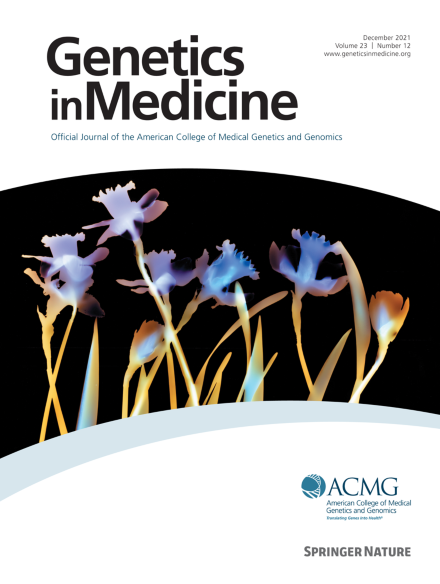临床基因检测的主流化:一个概念框架。
IF 6.2
1区 医学
Q1 GENETICS & HEREDITY
引用次数: 0
摘要
目的:对基因检测的需求在整个医学领域不断增加,而遗传学劳动力保持稳定。作为回应,正在引入主流模式,即非遗传学家临床医生参与基因检测途径。由于标准化的方法将促进评估和最佳的病人护理,一个统一的框架是必要的。方法:通过与临床遗传学专家的焦点小组讨论,提出临床基因检测主流化的概念框架。通过达成共识的过程,专家们阐明了诊断护理途径中的步骤,并定义了一组影响主流化模式最适合特定患者护理方案的变量。结果:35个人代表20个不同的临床遗传学服务和加拿大所有省份参与了框架的开发。该框架描述了四种可概括的主流护理模式,每种模式在诊断护理途径中都有不同程度的临床遗传学服务参与。结论:该框架将有助于指导临床团队设计和评估主流化工作。至关重要的是,这些项目以标准化的方式进行评估和共享,以便我们能够实施策略,使遗传资源得到最佳利用,并改善患者护理。本文章由计算机程序翻译,如有差异,请以英文原文为准。
Mainstreaming of clinical genetic testing: A conceptual framework
Purpose
Demand for genetic testing is increasing across medicine, whereas the genetics workforce remains stable. In response, mainstreaming models are being introduced, in which nongeneticist clinicians are increasingly involved in the genetic testing pathway. Because a standardized approach would facilitate evaluation and optimal patient care, a unified framework is warranted.
Methods
Through a focus group with clinical genetics experts, a conceptual framework for the mainstreaming of clinical genetic testing is proposed. Through a consensus process, experts elucidated the steps in the diagnostic care pathway and defined a set of variables that influence which mainstreaming model is best suited to specific patient care scenarios.
Results
A total of 35 individuals representing 20 distinct clinical genetics services and all Canadian provinces participated in the development of the framework. The framework describes 4 generalizable mainstreaming models of care, each with varying levels of involvement of the clinical genetics service in the diagnostic care pathway.
Conclusion
This framework will help guide clinical teams in the design and evaluation of mainstreaming efforts. It is critical that these programs are evaluated and shared in a standardized way so that we can implement strategies that allow optimal utilization of genetics resources and improve patient care.
求助全文
通过发布文献求助,成功后即可免费获取论文全文。
去求助
来源期刊

Genetics in Medicine
医学-遗传学
CiteScore
15.20
自引率
6.80%
发文量
857
审稿时长
1.3 weeks
期刊介绍:
Genetics in Medicine (GIM) is the official journal of the American College of Medical Genetics and Genomics. The journal''s mission is to enhance the knowledge, understanding, and practice of medical genetics and genomics through publications in clinical and laboratory genetics and genomics, including ethical, legal, and social issues as well as public health.
GIM encourages research that combats racism, includes diverse populations and is written by authors from diverse and underrepresented backgrounds.
 求助内容:
求助内容: 应助结果提醒方式:
应助结果提醒方式:


